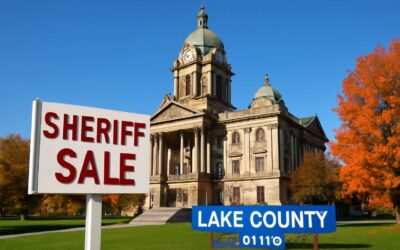Understanding REO Auction Property
Definition of REO Property – Explaining what REO stands for and basic concept
Imagine stumbling upon a hidden treasure chest, but instead of gold coins, you find a real estate goldmine—welcome to the world of REO auction property. REO stands for “Real Estate Owned,” a term that makes it sound like a secret society rather than a straightforward financial transaction. When banks or lenders take possession of a property after foreclosure, these properties become REO assets, often waiting impatiently for a new owner to breathe life back into them.
So, what is REO auction property? It’s the final chapter of a property’s foreclosure saga, where financial institutions sell off their repossessed assets through auctions. These auctions are a unique blend of opportunity and risk, offering potential buyers a chance to acquire properties at a fraction of market value. Typically, REO properties are sold “as-is,” meaning no warranties or repairs—just a straightforward sale that could turn out to be a lucrative investment or a costly lesson in real estate.
Understanding what is REO auction property is essential if you’re considering entering the South African property market, where these sales often come with a twist of local regulations and market dynamics. Whether you’re a seasoned investor or a curious newcomer, knowing how to navigate these auctions can open doors to hidden gems. After all, in the world of REO, fortunes are made when you know where to look and what to look for!
Difference Between REO and Foreclosure Properties – Clarifying distinctions and similarities
Understanding the difference between REO and foreclosure properties can be as perplexing as trying to decipher a spy’s secret code. While they are often tossed into the same basket, they are distinct chapters in the property saga. So, what is REO auction property, and how does it differ from a straightforward foreclosure? The key lies in ownership status. Foreclosure properties are still technically owned by the bank during the auction process, often going under the hammer at a sheriff’s sale or public auction. REO, on the other hand, stands for “Real Estate Owned,” which means the bank has already taken control and now actively manages the property.
Once a property enters the REO phase, it typically moves to a different sales channel—often through bank-approved auctions or direct negotiations. The main difference? REO auction property is usually sold “as-is,” with the bank eager to offload these assets quickly to recover some losses. Here’s a quick glance at what sets them apart:
- Foreclosure properties are still in the legal process, often requiring the highest bidder at an auction to take ownership.
- REO properties have cleared the legal process, with the bank now the official owner, ready for a sale that’s less frantic and more streamlined—though still packed with potential pitfalls.
In essence, understanding what is reo auction property offers a window into a different realm of real estate—one where opportunities abound, but so do pitfalls for the unwary. Whether you’re hunting for a bargain or a hidden gem, knowing these nuances can mean the difference between a lucrative investment or a costly misadventure in the South African property market.
What Makes REO Properties Unique – Key features that set REO auction properties apart
Stepping into the realm of REO auction property reveals a landscape rich with opportunity and intrigue. These properties are not merely pieces of real estate; they are stories waiting to be rewritten. Unlike traditional sales, REO properties have already passed the storm of foreclosure and now sit calmly in the bank’s possession, awaiting their next chapter. Understanding what is reo auction property uncovers a world where assets are sold in a more controlled, streamlined manner—often with fewer legal hurdles and more room for strategic negotiations.
What makes REO properties truly unique is their transition from distressed assets to bank-owned treasures. They often come with distinctive features, such as being sold “as-is” and requiring a keen eye for potential hidden within their walls. These properties can range from charming homes with untapped potential to investment opportunities that promise significant returns. Their key features include:
- Clear title and ownership, as the bank has already taken control
- Often sold through bank-approved auctions or direct negotiations
- Availability of properties that have been inspected, but still may need repairs
In the grand tapestry of South African real estate, understanding what is reo auction property unlocks a portal to a universe teeming with possibility. For those brave enough to navigate its complexities, the rewards can be truly extraordinary, transforming a seemingly overlooked asset into a coveted jewel of investment.
How REO Auction Properties Are Managed
Role of Banks and Lenders – How financial institutions handle REO properties
In the vast landscape of real estate, banks and lenders serve as the silent custodians of countless properties, especially when foreclosure clouds loom on the horizon. Their role in managing what is REO auction property is both intricate and strategic, akin to an artist carefully shaping a masterpiece from chaos. When a homeowner defaults, the financial institution steps in, transforming the distressed property into a tangible asset that must be handled with precision and care.
Rather than allowing the property to languish in limbo, banks typically initiate a process to sell these properties quickly, often through REO auctions. This method not only recovers some of the outstanding debt but also ensures the property is cycled back into the market efficiently. The management of REO properties involves a delicate balance—maintaining the property’s condition, navigating legal complexities, and preparing it for a future owner. It’s a process where every detail matters, and each decision can influence the property’s destiny in the vibrant South African real estate market.
The Auction Process for REO Properties – Step-by-step overview of the auction process
The journey of managing REO auction properties is a meticulous dance of precision and strategic foresight. Once a property enters the realm of REO—Real Estate Owned—banks and lenders shift from cautious custodians to active participants in its rebirth. The question that often arises is: what is REO auction property? It’s not merely a piece of real estate; it’s a carefully curated asset, poised between despair and opportunity.
The auction process for REO properties unfolds through a series of deliberate steps designed to streamline the sale while safeguarding the interests of the financial institution. Initially, the bank assesses the property’s condition, ensuring it’s market-ready, often involving repairs or legal clearance. When ready, the property is listed publicly, attracting a pool of diverse bidders eager for investment or redevelopment. The auction itself typically follows these stages:
- Pre-auction preparation, including property inspections and marketing.
- Public announcement of the auction date, often with detailed property disclosures.
- Open bidding, where registered participants compete in real-time.
- Winning bid confirmation, followed by legal transfer procedures.
Understanding what is REO auction property involves recognizing this orchestrated sequence, which transforms distressed assets into potential gold mines, especially within the vibrant South African real estate market. Each phase is vital, a testament to the intricate ballet of economic recovery and strategic investment.
Who Can Bid on REO Properties – Eligibility criteria for buyers and investors
Managing REO auction properties is a nuanced art, blending strategic oversight with meticulous attention to detail. Once a property becomes part of the REO landscape, banks and lenders shift from passive guardians to active stewards, ensuring the asset is market-ready. This involves comprehensive property inspections, legal clearances, and often necessary repairs to maximize its appeal at auction. The goal is to present a compelling opportunity for bidders while safeguarding the financial institution’s interests.
Who can bid on REO properties? Eligibility criteria tend to be straightforward but crucial. Typically, interested buyers must register prior to the auction, providing proof of funds or a deposit to demonstrate serious intent. In South Africa, this process often involves complying with specific registration protocols and sometimes presenting a valid identification or business registration.
Participants range from individual investors to corporate entities, all eager to seize the potential of these distressed yet promising assets. Some auctions may even favor seasoned investors familiar with the intricacies of REO transactions, while others open the door to first-time buyers driven by the allure of investment opportunities.
Furthermore, it’s worth noting that what is reo auction property extends beyond just the bidding process. It embodies a carefully curated journey—one that transforms distressed assets into vibrant investments—making understanding who can bid an essential part of navigating this intriguing realm of South African real estate.
Benefits of Buying REO Auction Property – Advantages such as pricing, availability, and potential equity
Managing REO auction properties is a delicate dance that combines strategic insight with meticulous execution. Banks and lenders don’t simply offload these assets—they transform them into opportunities by conducting thorough inspections, legal reviews, and often necessary repairs. This process ensures that each property is market-ready, maximizing its appeal to potential buyers. The management phase turns a distressed asset into a compelling investment, often leading to faster sales and better returns.
Buying REO auction property offers notable benefits, particularly in pricing and availability. These properties are typically sold below market value, creating an attractive entry point for investors and homeowners alike. The competitive pricing can lead to significant equity gains, especially if the property is renovated or improves in value over time. Additionally, the pool of available properties is vast—ranging from urban apartments to sprawling estates—giving buyers a diverse array of options.
One of the most appealing advantages of purchasing what is reo auction property is the potential for equity. Investors often see these transactions as a chance to acquire undervalued assets, which can be transformed into lucrative holdings with strategic upgrades. The abundance of REO properties on the market means that motivated buyers can find opportunities that align with their financial goals, making the entire process both exciting and rewarding.
Finding and Purchasing REO Auction Properties
Where to Find REO Auction Listings – Sources for locating REO properties
Within the labyrinthine corridors of real estate, the realm of REO auction properties stands as a captivating frontier—an arena where opportunities shimmer like distant stars in the night sky. For those daring enough to explore, discovering where to find REO auction listings becomes an adventure filled with hidden treasures. Understanding what is REO auction property is the key to unlocking a world where banks and lenders turn over properties to eager buyers via auction, often at compelling prices.
When seeking out these elusive assets, several sources serve as gateways to the most coveted REO listings. Many auction platforms and government websites maintain comprehensive catalogs that are updated regularly, offering a treasure trove of properties ready for purchase. Additionally, contacting local real estate agents who specialize in distressed properties can provide insider knowledge and early access to upcoming auctions. For those who prefer a digital voyage, dedicated online auction sites dedicated to REO properties offer a seamless, user-friendly experience. Exploring these avenues ensures no opportunity slips through the cracks in the quest for the perfect REO auction property.
Tips for Bidding on REO Auction Properties – Strategies for successful bidding
Securing a winning bid at an REO auction can feel like navigating a labyrinth—thrilling yet daunting. For those who understand what is REO auction property, this arena offers a unique chance to acquire distressed real estate at potentially below-market prices. The secret lies in mastering the art of bidding, where strategy and timing are everything. One effective approach is to thoroughly research the properties beforehand, identifying those with solid potential despite their rough exterior.
Successful bidders often follow a disciplined process, such as setting a maximum bid limit and sticking to it. Staying alert to auction cues and understanding the bidding rhythm can give you a crucial edge. Additionally, some investors recommend participating in pre-auction inspections or viewing the property virtually to assess its true condition. Remember, in the world of what is REO auction property, patience and preparation can turn the tide in your favor. Whether you’re a seasoned investor or a first-time buyer, these bidding tips help turn an uncertain auction environment into a land of opportunity.
Important Factors to Consider Before Buying – Property condition, title transfer, and legal considerations
Understanding what is REO auction property is crucial for anyone looking to make strategic real estate investments. These properties are typically owned by banks or lenders after foreclosure proceedings. They are sold through auction to recover unpaid mortgage balances quickly. Unlike traditional sales, REO auction properties often present opportunities for buyers to acquire homes or commercial spaces at below-market prices.
When considering the purchase of a REO auction property, it’s vital to evaluate its condition thoroughly. Many of these properties may have been neglected or damaged, so inspecting them before bidding can prevent surprises later on. Additionally, legal considerations such as clear title transfer are essential. Ensure that the property’s title is free of liens or encumbrances, which could complicate ownership transfer.
- Property condition assessment
- Verifying clear title transfer
- Legal due diligence to avoid hidden liabilities
By understanding these factors and conducting due diligence, buyers can navigate the complex landscape of what is REO auction property confidently. This knowledge helps turn a potentially risky investment into a lucrative opportunity, especially in South Africa’s dynamic real estate market.
Steps to Purchase and Close on REO Auction Property – From bidding to ownership transfer
Embarking on the journey of acquiring a property through an REO auction can feel like stepping into uncharted territory. Once you’ve identified a promising REO auction property, the next phase involves navigating the steps from bidding to ownership transfer. This process demands patience, strategic insight, and meticulous attention to detail. Understanding what is REO auction property and how to purchase it can unlock access to below-market prices and lucrative investment opportunities in South Africa’s vibrant real estate landscape.
The first critical step is thorough due diligence. Potential buyers should verify the property’s legal standing, ensuring the title is free of liens or encumbrances. Simultaneously, inspecting the property’s condition is essential to avoid unexpected costs later. Once satisfied, participants can proceed to participate in the auction, either online or in person, depending on the platform used by the bank or lender.
- Register for the auction and review the terms and conditions carefully.
- Place bids strategically, considering the property’s condition and market value.
- Win the auction and fulfill any deposit requirements promptly.
- Complete the legal paperwork to transfer ownership, ensuring all liens are cleared.
From bidding to closing, the pathway to owning an REO auction property hinges on diligent research and swift action. Once ownership is transferred, the real work—whether renovation or resale—begins. Ultimately, understanding what is REO auction property and mastering these steps can transform what seems like a complex process into a rewarding investment adventure in South Africa’s dynamic real estate market.
Pros and Cons of Buying REO Auction Property
Advantages of REO Auction Buying – Cost savings, portfolio diversification, and inventory availability
Buying REO auction property is like discovering a hidden gem in the cluttered world of real estate. For investors and savvy buyers alike, it offers a tantalizing mix of opportunities and pitfalls. One of the biggest advantages of knowing what is REO auction property is the potential for significant cost savings. These properties typically sell below market value, making them a magnet for those looking to maximize return on investment.
Moreover, REO auction properties often come with a surprisingly abundant inventory, providing a broader selection than traditional listings. This means more options for buyers seeking specific features or locations, especially in competitive markets. Of course, it’s not all sunshine and roses—there are some cons, like the need for thorough due diligence and the possibility of hidden property issues. But for those who navigate carefully, the advantages of buying REO auction property—such as portfolio diversification and the chance to acquire properties at a bargain—far outweigh the risks.
Potential Drawbacks and Risks – Aspects like property condition, hidden costs, and market risks
Understanding the potential drawbacks of investing in what is REO auction property is crucial for making informed decisions. While these properties can offer incredible value, they often come with inherent risks that demand careful consideration. One of the most significant concerns is the condition of the property. Many REO auction properties have been vacant for extended periods, leading to deterioration or unnoticed damage. Without proper inspection, buyers may face unexpected repair costs that erode any initial savings.
Hidden costs are another aspect to be mindful of. These can include back taxes, liens, or unresolved legal issues tied to the property. Such unforeseen expenses can quickly turn a seemingly bargain deal into a financial burden. Additionally, market risks—such as fluctuating property values or economic downturns—can impact the potential return on investment.
For those wondering what is REO auction property, it’s vital to recognize that these properties often come with a complex legal and financial history.
- Property condition
- Hidden costs
- Market fluctuations
These factors highlight why thorough due diligence is essential. While the allure of acquiring properties at below-market prices is tempting, understanding the potential drawbacks helps prevent costly surprises down the line. Navigating these challenges requires patience, expertise, and a sharp eye for detail—qualities that can turn a risky investment into a rewarding opportunity.
How to Minimize Risks – Due diligence tips and professional assistance
Venturing into the realm of what is REO auction property reveals a landscape filled with both opportunity and complexity. The allure of acquiring property below market value is undeniable, yet it’s essential to weigh the pros and cons carefully. On one hand, REO auction properties can unlock significant savings and diversify an investment portfolio. However, the flip side presents potential pitfalls—such as hidden repair costs or legal entanglements—that could turn a seemingly perfect deal into a financial labyrinth.
To navigate this enchanted terrain, diligent due diligence is your best compass. Conduct thorough inspections, scrutinize title histories, and seek professional assistance to unveil hidden costs and assess property condition. A savvy bidder might consider an ordered approach—such as creating a checklist of legal and structural concerns—before placing a bid. In the end, understanding what is REO auction property and approaching it with informed caution transforms what could be a risky gamble into a rewarding adventure.
Legal and Financial Considerations
Understanding Titles and Liens – Title issues and liens associated with REO properties
Understanding the intricacies of what is REO auction property involves navigating a complex web of legal and financial considerations. One of the most critical aspects revolves around titles and liens—elements that can dramatically influence the value and transferability of the property. When a property becomes REO—real estate owned by banks or lenders after foreclosure—it often carries unresolved legal encumbrances that prospective buyers must scrutinize thoroughly.
Liens can be a significant obstacle, as they may include unpaid taxes, mortgages, or judgment claims. These encumbrances can complicate the title transfer process, making it essential for buyers to conduct comprehensive title searches. A clear understanding of these issues ensures that the buyer’s investment isn’t compromised by hidden legal liabilities. In some cases, resolving liens prior to purchase involves negotiating with lien holders or clearing debts, which can add layers of complexity but also opportunity for savvy investors seeking below-market deals.
To simplify this process, many professionals recommend examining the title history meticulously. Engaging with title companies or legal experts can help identify potential hurdles early—saving time, money, and future headaches. Ultimately, grasping the legal and financial landscape surrounding what is REO auction property empowers buyers to make informed decisions and avoid costly surprises down the line.
Financing Options for REO Auction Properties – Mortgage options, cash deals, and hard money loans
Securing financing for REO auction property can feel like navigating a labyrinth, especially when you’re eager to seize a promising deal. Traditional mortgage options are available, but they often come with stringent approval processes and lengthy timelines—something that doesn’t always align with the fast-paced nature of REO auctions. For many investors and homebuyers, cash deals present a more straightforward route, allowing for quick transactions and minimized contingencies. However, not everyone has access to large sums of cash, which is where alternative financing options come into play.
Hard money loans are increasingly popular among those looking to purchase what is REO auction property. These short-term, asset-based loans are provided by private lenders who focus on the property’s value rather than the borrower’s creditworthiness. Because of their flexibility and speed, hard money loans can be a game-changer, especially in competitive auction settings. Some bidders also explore seller financing or partnerships, which can provide additional avenues to secure the necessary funds.
In particular, understanding the diverse financing landscape can empower buyers to act swiftly and confidently. For example, an ordered list of common options includes:
- Traditional mortgages
- Cash purchases
- Hard money loans
- Seller financing
Each of these avenues offers distinct advantages and challenges, but when combined with thorough due diligence, they become powerful tools in the quest to acquire what is REO auction property. The key is to match the right financial strategy with your investment goals and the specific circumstances of the property in question. In a market where timing and decisiveness often spell the difference between winning and losing, understanding your financing options is crucial to turning potential into success.
Important Legal Documentation – Contracts, disclosures, and required paperwork
In the complex landscape of real estate transactions, understanding the essential legal documentation surrounding what is REO auction property can be the difference between a seamless purchase and a costly mistake. When bidding on REO properties, meticulous attention to contracts, disclosures, and legal paperwork is paramount. These documents serve as the blueprint of your legal rights and obligations, ensuring transparency and protection throughout the process.
Typically, buyers are required to review and sign a purchase agreement that clearly delineates terms, conditions, and contingencies. Disclosures—ranging from property defects to lien information—are crucial in assessing the true value and potential risks associated with the REO auction property. Failing to scrutinize these documents can lead to unforeseen liabilities, making due diligence an indispensable step in the acquisition journey.
To navigate this legal terrain confidently, it’s wise to familiarize yourself with the necessary paperwork, which often includes title transfer documents, lien releases, and proof of funds or earnest deposits. An informed approach not only minimizes exposure to legal pitfalls but also accelerates the closing process—an essential consideration in the fast-paced realm of REO auctions.
Remember, when exploring what is REO auction property, understanding the legal framework surrounding the sale empowers you to act decisively and protect your investment. In this arena, every document tells a story—your job is to read between the lines and ensure your interests are safeguarded at every turn.




0 Comments